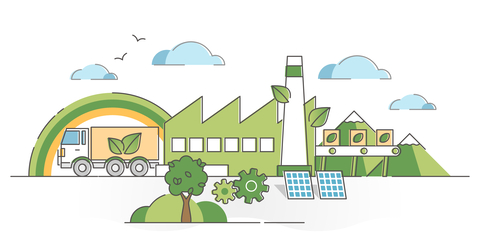
As the global focus on sustainability continues to grow, industrial manufacturers are under increasing pressure to adopt environmentally friendly practices. This is sometimes a sore spot for users of chemicals, since the chemical industry has a reputation for being heavily reliant on fossil fuels and petrochemicals. So how can you increase the sustainability of your chemical raw materials without sacrificing the unique quality and functionality of the chemistry you are using?
One solution is the mass balance approach to chemical manufacturing. With several large chemical producers such as Shell, BASF, Evonik and Wacker adopting this method, you might be asking yourself what exactly is the mass balance approach? Mass balance is a widely accepted method of tracking “renewable” carbons where sustainable raw materials, such as raw material made of bio-based or recycled content, are mixed in with conventional raw materials and put through the same manufacturing process using existing infrastructure. The result is a cost-effective and efficient way to improve the sustainability of your supply chain without changing the functional chemistry altogether.
The are many benefits to using a mass balance method. The result is a product that helps meet customer-driven sustainability goals, lowers the product’s carbon footprint, and contributes toward a circular economy. By using the existing infrastructure for this process, it eliminates the extra cost and environmental impact of building an entirely new manufacturing plant. The products also retain the same performance characteristics as their conventional counterparts. This entire process is measurable and can be certified by trusted independent standard organizations.
This approach has been likened to being the “hybrid car” of chemical manufacturing. While it is not 100% circular or carbon neutral in nature, it’s still better than the alternative and can be implemented very simply and without the start-up costs. To achieve a truly circular economy, mass balance won’t be needed, but this practical approach is viewed as a step in the right direction as companies collectively commit to a more sustainable future.
Ask your ChemCeed representative today about the products in our line that include bio-based or renewable content. ChemCeed is a happy to provide Life Cycle Assessment (LCA) data for these products. The production of these products is certified by ISCC-Plus and ISCC-EU (International Sustainability and Carbon Certification) for the traceability and sustainability of raw materials in the supply chain.
ChemCeed’s Reduced Carbon Footprint Product Offerings:
